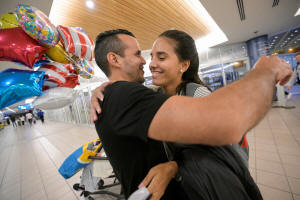U.S. grants some Venezuelans speedy entry under new program, sponsors
say
 Send a link to a friend
Send a link to a friend
 [November 02, 2022]
By Ted Hesson and Jackie Botts [November 02, 2022]
By Ted Hesson and Jackie Botts
(Reuters) - U.S. sponsors applying to bring
Venezuelans into the United States under a new program are receiving
approvals in hours or days, a lightning-fast pace that could soon fill
up available spaces in the program, according to U.S. sponsors and
advocates.
Some sponsors are U.S.-based relatives of Venezuelans eager to flee
political and economic turmoil back home. But others, like South Florida
business consultant Maria Antonietta Diaz, are willing to help
strangers. Diaz, a Venezuelan-American advocate who has lived in the
United States for the past 25 years, got in touch with Venezuelans
seeking sponsors via social media.
Since the humanitarian program officially launched on Oct. 18, Diaz has
already been approved to sponsor nine Venezuelans - six in her hometown
of Maracaibo, Venezuela, and another three in Mexico en route to the
United States.
The program does not have explicit income requirements but Diaz and her
husband earn $150,000 annually, far above the roughly $23,000 that would
typically be required to sponsor someone for a U.S. green card.
Around 7,000 Venezuelans have been approved for the new program since
the Oct. 18 launch, a source familiar with the matter told Reuters. The
source did not say how many had applied.
"It is clear that this orderly and limited way to live and work in the
United States is providing incentives to Venezuelans to not put their
lives in the hands of smugglers," the person said, requesting anonymity
to share internal figures.
Diaz's request to sponsor a Venezuelan man in Cuernavaca was approved in
just an hour, she said. She submitted another for two women in Mexico
City at midnight and woke at 7 a.m. to see it was approved. Other
organizations tracking the program also said applications have been
approved quickly.
"It's incredible," Diaz said, calling it "huge progress" compared with
the normal pace of U.S. immigration processing, which can take years in
some cases.

U.S. President Joe Biden, a Democrat, launched a two-pronged approach to
deter illegal border crossings last month. Venezuelans caught crossing
illegally are now expelled back to Mexico under a pandemic-era order
known as Title 42, while up to 24,000 Venezuelans will be allowed to
enter legally through the program if they apply while they are abroad.
Biden, a Democrat, has struggled with record numbers of migrant
crossings at the U.S.-Mexico border during his presidency - including
187,000 Venezuelans just in fiscal year 2022 - and Republicans have
ramped up criticism as they aim to take control of the U.S. Congress in
Nov. 8 midterm elections.
[to top of second column]
|

Venezuelan Victoriana Loaiza reunites
with her partner Jhonny Rosales after she arrives from Mexico City
to Orlando International Airport in Orlando, Florida, U.S., October
31, 2022. REUTERS/Phelan M. Ebenhack

On Monday, Reuters video showed Border Patrol shot projectiles at
Venezuelan and Central American migrants who crossed the Rio Grande
during a protest that started on the Mexican side of the border.
A SAFER OPTION
For 23-year-old Victoriana Loaiza, who was expelled from the United
States to Mexico after trekking for more than a month through South
and Central America to get to the border, Diaz was a lifeline.
Loaiza managed a luxury accessory store in Maracaibo, but she said
her $180 monthly income was not enough to support her 5-year-old
son, as the price of a monthly basket of goods for a family has
risen to around $375, according to the Venezuelan Finance
Observatory.
After being sent back to Mexico, she quickly found Diaz through a
friend, contacted her on Oct. 18, applied for the program and was
approved by Oct. 27. She flew to Orlando on Monday, where she met
her boyfriend, who arrived last year but could not act as her
sponsor as he himself is applying for U.S. asylum and lacks legal
status. She hopes to bring over her son once she is settled.
Venezuelans approved through the program - which is modeled on a
similar effort launched earlier this year for Ukrainians fleeing the
Russian invasion - receive permission to reside in the United States
for up to two years and can apply for a work permits.
U.S. sponsors do not need to be related to Venezuelans to support
their applications, but they must have permission to reside in the
United States. Both sponsors and Venezuelan applicants have to pass
background checks.
A week after the new program was announced and the Mexico return
policy was enacted, U.S. authorities saw an 80% decrease in
Venezuelan border encounters.
Loaiza said the program provides a safer alternative to Venezuelans
than venturing through the Darien Gap, a jungle separating Colombia
and Panama that she traveled through on foot.
"It prevents a lot of people from risking their lives," she said.
(Reporting by Ted Hesson in Washington and Jackie Botts in Oaxaca;
Additional reporting by Kristina Cooke in San Francisco and Elida
Moreno in Panama City; Editing by Mica Rosenberg and Aurora Ellis)
[© 2022 Thomson Reuters. All rights
reserved.]
This material may not be published,
broadcast, rewritten or redistributed.
Thompson Reuters is solely responsible for this content.
 |